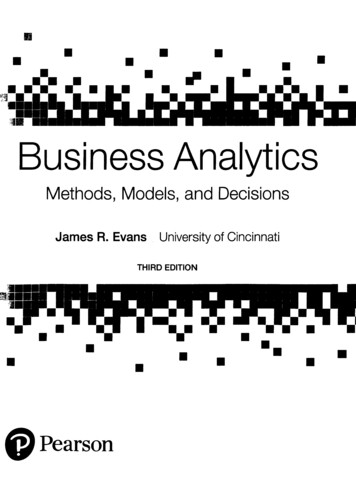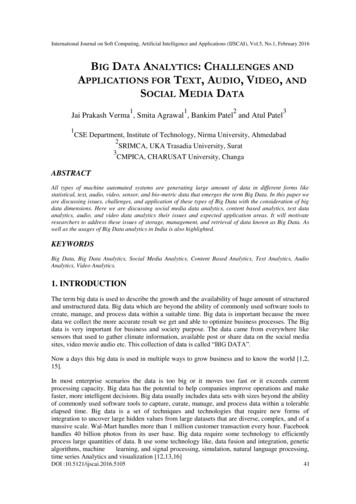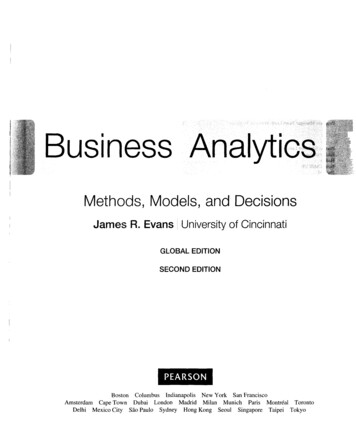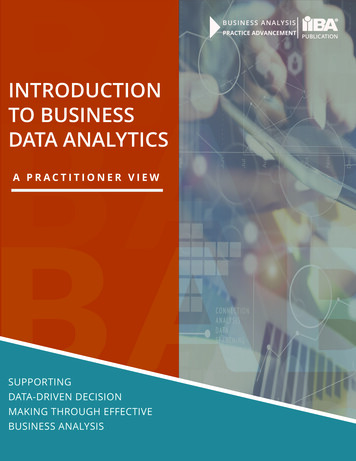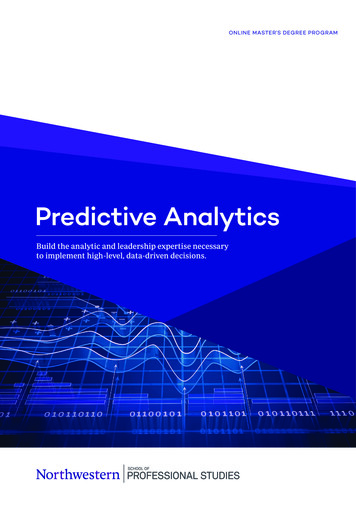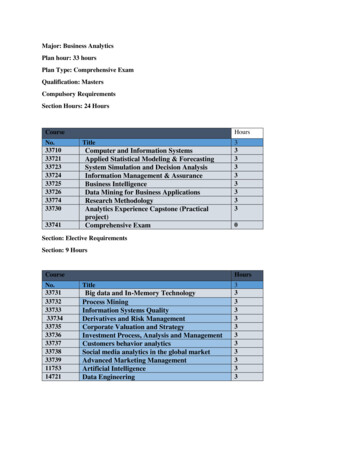
Transcription
Major: Business AnalyticsPlan hour: 33 hoursPlan Type: Comprehensive ExamQualification: MastersCompulsory RequirementsSection Hours: 24 37743373033741TitleComputer and Information SystemsApplied Statistical Modeling & ForecastingSystem Simulation and Decision AnalysisInformation Management & AssuranceBusiness IntelligenceData Mining for Business ApplicationsResearch MethodologyAnalytics Experience Capstone (Practicalproject)Comprehensive Exam3333333330Section: Elective RequirementsSection: 9 3738337391175314721HoursTitleBig data and In-Memory TechnologyProcess MiningInformation Systems QualityDerivatives and Risk ManagementCorporate Valuation and StrategyInvestment Process, Analysis and ManagementCustomers behavior analyticsSocial media analytics in the global marketAdvanced Marketing ManagementArtificial IntelligenceData Engineering333333333333
Computer and Information Systems (33710)This course focuses on the management concepts and information technology needed to createeffective information systems. Topics include: a survey of information technology, informationsystems and organizations, strategic information systems, management support systems, andethical and social issues in information systems.Applied Statistical Modeling & Forecasting (33721)This course explores statistical modeling and analysis techniques for aiding managerial decisionmaking. Topics include: introduction to descriptive statistics, sampling methods and samplingdistribution, confidence interval estimation, one sample hypothesis tests, one-way and two-wayanalysis of variance, simple and multiple linear and nonlinear regressions, and time seriesforecasting. Selected software packages are used in exercises, projects, and business caseexamples.System Simulation & Decision Analysis (33723)In this course students will learn how to design, model, and implement discrete-event computersimulation models of real or conceptual systems. Simulation studies will be conducted usingcontemporary software such ProModel. Student will learn random number generation, applyingdistribution sampling, and conducting output analysis.Information Management Assurance (33724)This course will provide the students with an exposure to the unique concerns and realities ofassuring information and managing risks in the IT environment today. The course will coverprinciples of security from a managerial point of view, but will provide the students with enoughof a technical focus to actively participate in the process of organizational security. Students willbe exposed to the problems and dangers from insecure IS and the means, including physical,technical and administrative controls, to prevent security breaches, while also learning to respondto a breach when it does happen. Students will take this knowledge to learn to develop securityplans and conduct security audits. Coursework will include extensive reading and seminarparticipation as well as time in the laboratory to explore and reinforce concepts.Business Intelligence (33725)This course will introduce students to the fundamentals of data warehouses (DW) and datamining (DM). Topics will focus on how to leverage big data to support business decisions.Going through major activities involved in a data warehousing project, students will study theprinciples of dimensional data models, data warehouse architecture and infrastructure, techniques
for data extraction, cleaning, transformation, and loading, online analytical processing (OLAP),and managerial issues of data warehouse implementation. Common data mining techniques andapplications, such as decision trees association rules, text mining, rule based classification,cluster analysis, machine learning, will be introduced.Data Mining for Business Applications (33726)The purpose of this course is to provide students with both quantitative and qualitative exposureto the field of Data Mining, a topic of immense importance and relevant to the study of BusinessAnalytics. Data Mining is the process of discovering meaningful correlations, patterns and trendsin large data sets and employs statistical and mathematical techniques. Students will be exposedto theory, computation, tools & techniques to analyze repositories of data from a vast array ofbusiness applications with a view to implement successful business strategies aimed at improveddecision-making. The course contents are representative of three primary areas of analyticsprescriptive, predictive, and descriptive that define the core of studies offered in our Masters ofScience in Business Analytics program. Selected software packages are used in exercises tosolve data mining problems.Research Methodology (33774)This course develops the students’ skills in conducting scientific research through introducingthem to scientific research methods and providing them with basic skills in writing scientificresearch which includes defining the problem of study and its its variables, the researchsignificance and objectives, the research model and its variables based on literature review, howto define the population and sample of the study, data collection and hypotheses writing andtesting methods in addition to their analysis and interpretation using statistical methods, writingthe conclusions and recommendations and linking them to the literature review, and introducingthe students to various documentation methods.Analytics Experience Capstone (33730)The purpose of this course is to provide students with an experience that allows them todemonstrate application of integrative knowledge aimed at addressing an industry relevantdecision-making problem by drawing on the breadth and depth of the Business Analyticsprogrammatic curriculum. The plan of studies requires that the student complete this courseunder the direction and guidance of the Instructor who may enroll the services of an industryexpert for advice. Depending on the size and complexity of the problem, one or many studentsmay be assigned to the project. The deliverables for the course are a detailed project reportdescribing evaluation and analysis of the problem to be presented at a public setting.Big Data in-Memory Technology (33731)
The main learning objectives & acquired competencies in this course includes: Learn the most important big data technologiesUnderstand the underlying theoretical principlesApplying technological approaches to solve practical issuesContent should cover the following: Definition and classification of the research field Big DataIntroduction to basic concepts of various Big Data technologies: MapReduce Hadoop NoSQL HBase Lambda architecture IoT In-Memory & SAP HANA Data warehouse offloading Machine Learning (Regression & Classification)Process Mining (33732)The course explains the key analysis techniques in business process mining. This course starts withan overview of approaches and technologies that use event data to support decision making andbusiness process (re)design. Then the course focuses on process mining as a bridge between datamining and business process modeling.Information Systems Quality (33733)This course examines two related areas of study: (1) the concepts of information systemsanalysis and design in business organizations and (2) the management of information quality inorganizations. Students will learn to plan and manage information systems projects, determineinformation requirements, model information process requirements, model system logicrequirements, design user interfaces, and implement and maintain information systems. Studentswill also gain an understanding of the dimensions of information quality, the assessment andimprovement of information quality in organizational settings, cognitive and behavioral aspectsof information quality, and the effect of information quality on organizational decision making.The implications of information quality for systems analysis and design and applications ofsystems analysis and design methodologies for the management of information quality will beexamined.Derivatives and Risk Management (33734)
The focus of this course is on understanding the derivative securities and their use in riskmanagement. This course provides an in-depth introduction to options and option pricing as wellas an extensive overview of forward, future and swap contracts. This course will draw upon theintuition and analytic tools developed to examine sophisticated financial products or strategiesthat firms and investors have used in their risk management.Corporate Valuation and Strategy (33735)This course examines a variety of financial management topics, such as project and enterprisevaluation and risk analysis, corporate restructuring, dividend policy, corporate governance, andcurrent asset management using case studies and readings.Investment Process, Analysis and Management (33736)This course provides an examination of the process of investment analysis and management.Topics include: analysis of fixed income securities, stock valuation, and introduction toderivative securities; discussion of portfolio theory and management; and an overview ofinvestment environment. Wherever it is appropriate, the above topics will also be discussed in aglobal context.Customer Behavior Analytics (33737)This course introduces students to concepts and theories developed in the behavioral sciences(economics, marketing, psychology, sociology, and anthropology) in relation to their influenceon consumer behavior. The course is designed to provide students with an in-depthunderstanding of consumer markets in order to develop effective marketing strategies.Social Media Analytics in the Global Marketing (33738)This course draws from key concepts in marketing, business economics, and operationsmanagement to provide a comprehensive account of global marketing issues and strategies. Thiscourse is designed to give students several opportunities to apply the theories and concepts theyhave learned in class, primarily through the use of Country Manager simulation and a series ofcase analyses.Advanced Marketing Management (33739)This course examines the current challenges facing the marketers, ranging from industryderegulation, Internet revolution to globalizing. Looked at closely are the emerging issuesimpinging on marketing decision, particularly in regard to focused marketing, relationshipmarketing, competitive advantage, positioning, and the marketing mix strategies. Term projectand case analyses are important components of the course.
Artificial Intelligence (11753)The course is divided into four parts, the first covering knowledge representation, the secondintroducing heuristic search and constraint satisfaction and the third is dedicated to advancedtopics such as rule-based Expert Systems, case-based reasoning, modelbased reasoning. Thefourth part is dedicated to machine learning techniques and theory. The following topics will bediscussed in the course: introduction to AI and applications; exhaustive search methods; heuristicsearch methods; First order logic for knowledge representation; other knowledge representationschemes such as semantic networks, frames; production rule systems; principles of expertsystems; Knowledge acquisition, planning and scheduling, machine learning techniques:decision trees, neural networks, Instance-Based-learning, Naïve Bayesian learning, Bayesiannetworks and learning theoryData Engineering (14721)The course starts by examining the modern data ecosystem and how it relates to running a smartand efficient data hub. Then, it shows the student how to perform the principle tasks involved inmanaging extracting, transforming and loading (ETL) data. This course will explain the data lifecycle in a Data science project. In addition, it will cover types of data, such as structured, semistructured and unstructured and the different formats of data and techniques used in the ETLprocess. The course also covers the elementary visualization aspects needed to understand thedata. It also takes the student through staging, profiling, cleansing, and migrating data.
Major: Business Analytics Plan hour: 33 hours Plan Type: Comprehensive Exam Qualification: Masters Compulsory Requirements Section Hours: 24 Hours 3 . and managerial issues of data warehouse implementation. Common data mining techniques and applications, such as decision trees association rules, text mining, rule based classification, .

